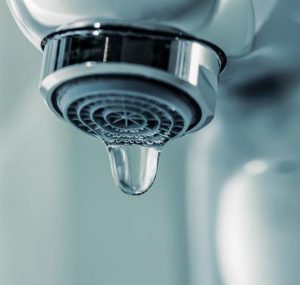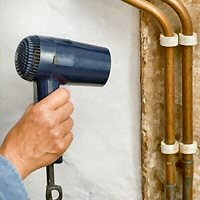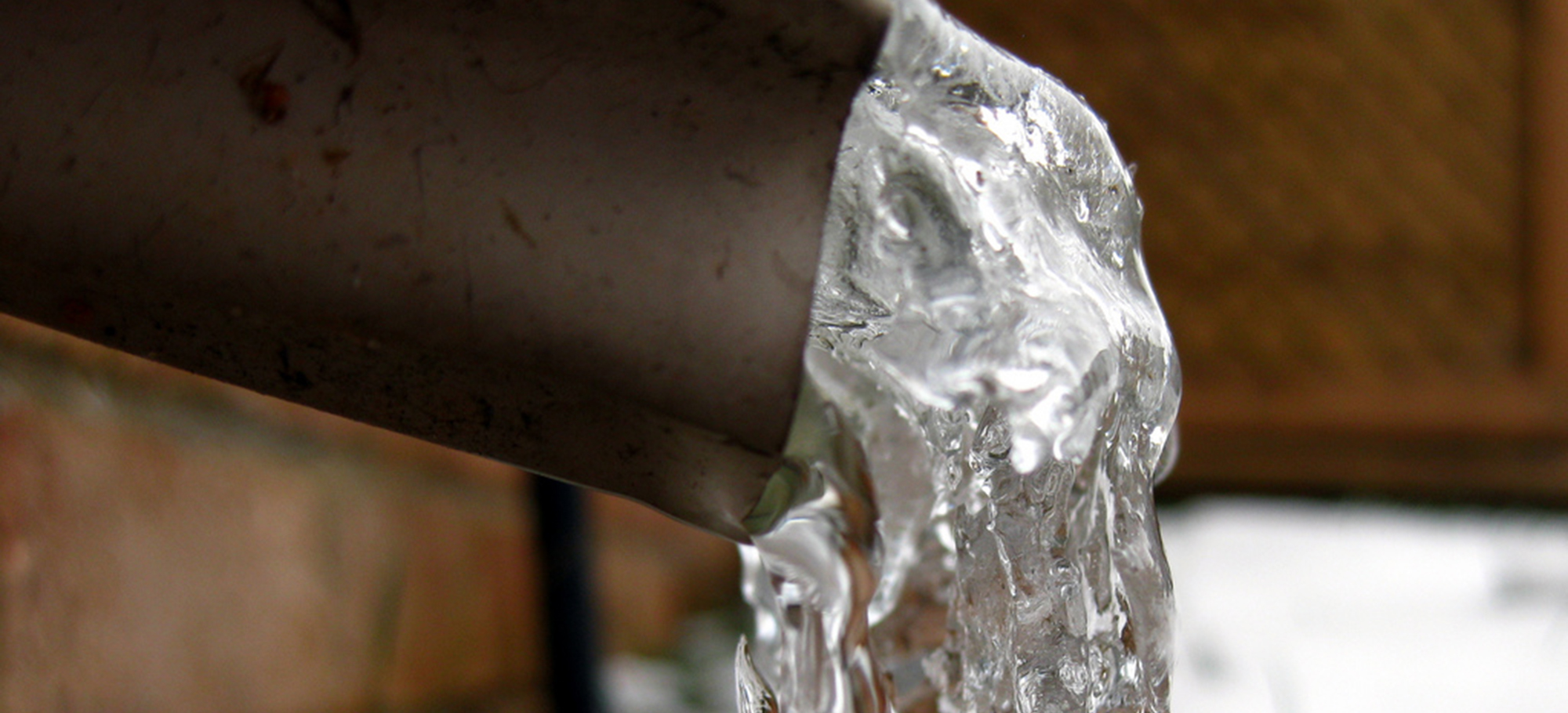Preventing Your Pipes From Freezing
Frozen pipes can cause a lot of damage to your home which may require costly repairs. As we know, water expands when it freezes. This means that when the water within your pipes freezes and expands this winter, it can potentially cause a burst pipe to occur. However, there are a few steps you can take to prevent this from happening. Follow just a few simple steps to help you in avoiding frozen pipes this winter.
How To Avoid Frozen Pipes
- Open the cabinet doors in your kitchen and bathroom. Doing so will allow warm air to circulate around the plumbing. This is especially helpful if your home’s sinks are on an exterior wall, causing them to be more susceptible to cold weather. However it is important to keep in mind that your cabinets may contain cleaning products or other potentially harmful chemicals. If you have young children or pets, make sure you remove these products before opening your cabinets.
 Running water through a pipe, even just a droplet, helps prevent frozen pipes. Let some water drip from the faucets that are connected to any exposed pipes. The flowing of the water prevents it from freezing. This technique is especially helpful in the event of a severe snowstorm or power outage.
Running water through a pipe, even just a droplet, helps prevent frozen pipes. Let some water drip from the faucets that are connected to any exposed pipes. The flowing of the water prevents it from freezing. This technique is especially helpful in the event of a severe snowstorm or power outage.- While this may seem like common sense, keeping your garage doors closed will help with avoiding frozen pipes this winter. If there are water supply lines in the garage, this will be extremely helpful. Again, you most likely won’t be leaving your garage doors open for extended periods of time. Just in case, covering all the bases when avoiding frozen pipes is important.
- Have your thermostat set to a steady temperature throughout the day and night. While you may feel you want to turn it down during the night to save money, refrain from doing so. You could be putting your home at risk for expensive water damage in the future. The bare minimum temperature you should be keeping it at is 55º Fahrenheit. Of course it will most likely be much higher than 55º, assuming that you and your family are home. However this temperature limit is good to keep in mind if you are going on a holiday trip and want to save a few bucks on your heating bill while you’re away.
- For a long term solution to avoid frozen pipes in your home, insulation may be the way to go. Adding pipe insulation to pipes in attics, basements, and crawl spaces will help prevent freezing. This method along with sealing up any potential cracks that could create drafts in these areas will keep pipes from freezing.
Thawing Out Frozen Pipes
 Applying some sort of heat to the pipes will help begin to melt the ice. You can use a space heater, a heating pad, or an electric hair dryer. You can wrap your pipes with towels that have been soaked in hot water if you don’t have another option. We don’t recommend using a blowtorch, a charcoal stove, or anything with an open flame. The extreme high temperature can damage your pipes or worse – start a fire in your home. Turning on your faucet can also help thaw out your pipes in the event that they do end up freezing. In addition to seeing results from applying heat, this can help speed the process along. Even if the water itself is cold, it will still help melt the ice. Continue these methods in combination with each other until full water pressure is restored. Ensure you’ve checked all faucets in your home to see if there are any other frozen pipes to thaw out.
Applying some sort of heat to the pipes will help begin to melt the ice. You can use a space heater, a heating pad, or an electric hair dryer. You can wrap your pipes with towels that have been soaked in hot water if you don’t have another option. We don’t recommend using a blowtorch, a charcoal stove, or anything with an open flame. The extreme high temperature can damage your pipes or worse – start a fire in your home. Turning on your faucet can also help thaw out your pipes in the event that they do end up freezing. In addition to seeing results from applying heat, this can help speed the process along. Even if the water itself is cold, it will still help melt the ice. Continue these methods in combination with each other until full water pressure is restored. Ensure you’ve checked all faucets in your home to see if there are any other frozen pipes to thaw out.
Things To Look Out For
When keeping your pipes warm or thawing them out, be aware of condensation. Condensation will occur. This is unavoidable. However, if you stay on top of it you can simply wipe it away in a timely fashion before it causes an issue. Wipe away the condensation immediately so that the moisture is not able to seep into the building materials surrounding your pipes. The moisture from the condensation seeping into your home’s building materials can cause mold. You’ve just gone through all this time and effort avoiding frozen pipes. You don’t need a mold problem on your hands on top of that. Do everything you can to avoid not only frozen pipes, but mold from condensation caused by thawing frozen pipes as well. A mold inspection can help clarify whether or not there is an issue.
To ensure that your home is mold free, contact a professional mold remediation company in your area.



